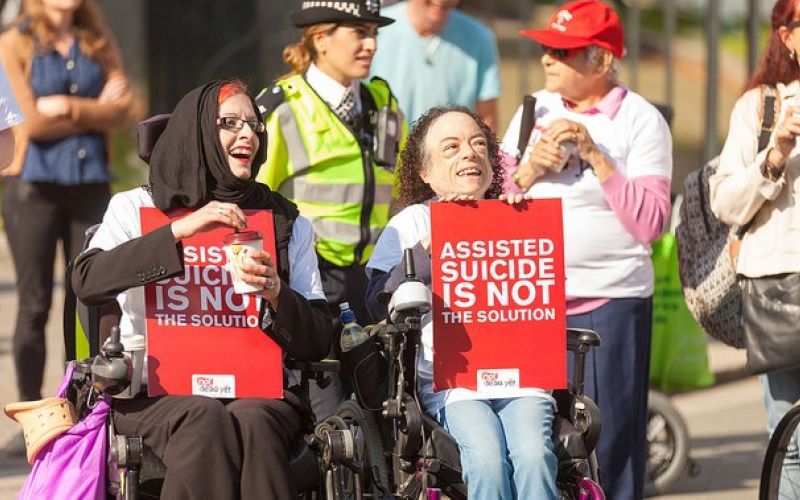The decision of Labour leader Keir Starmer to publicly back assisted suicide is “very alarming” and will make it “very, very difficult” for disabled campaigners to prevent its legalisation, according to those opposing a change in the law.
Starmer told ITV News this week that he was “personally in favour of changing the law” to allow assisted suicide in England and Wales.
Filmed during a telephone conversation with TV presenter and assisted suicide campaigner Esther Rantzen, who has lung cancer, he also promised to make time for parliament to vote on changing the law, if Labour wins the next general election.
His intervention came just weeks after a cross-party committee of MPs rejected attempts by a minority of its members to try to use a new report to push the government towards legalising assisted suicide in England and Wales.
That report by the health and social care select committee followed a 14-month inquiry, with more than 68,000 responses from members of the public to an online survey, more than 380 pieces of written evidence, and oral evidence from 29 experts and politicians.
Phil Friend, co-convenor of Not Dead Yet UK (NDY UK), told Disability News Service this week that he was “surprised and very worried” by Starmer’s comments.
He said the likelihood of having a prime minister openly in favour of legalisation for the first time would make it “very, very difficult” for disabled people opposing the move.
He said he did not believe Starmer understood the impact of poverty on disabled people and how that affects their feelings of being a “burden” on those around them.
He said: “Until social care and palliative care are available to everybody to a certain level, the talk about assisted suicide is really frightening, because what we know from the research is that people are likely to want to end their lives if they feel they’re a burden to others.”
Friend said he was concerned that Starmer’s Labour party did not appear to have any clear plans to improve social care and palliative care.
He said: “I would ask him to look at social care and those kinds of supports before he starts looking at legalising helping people to die.
“We just believe that before we talk about helping kill people, we should be talking about how we help them to live.”
He said there had been silence from Labour and other parties on how to solve the social care crisis.
Labour has repeatedly failed to address the concerns of disabled campaigners calling for an end to social care charges, and for action on the tens of thousands of disabled people every year who are having debt collection action taken against them over unpaid care charges.
Friend also urged Starmer to pay attention to the conclusions of the health and social care committee, and its decision not to call for legalisation.
And he said that it “rankles” that Rantzen had become a “flag-bearer” for legalisation when she was speaking from “such a privileged position” and when legalisation would put disabled people without her resources in even more vulnerable positions.
He said another concern Starmer appeared to have ignored was that it was cheaper for the state to fund assisted suicide than to pay for palliative care.
A report (PDF) by Canada’s parliamentary budget officer in 2020 found that introducing the Medical Assistance in Dying (MAID) assisted suicide scheme in 2016 for those with certain conditions would save an estimated $87 million a year by 2021, while expanding access to the scheme to those whose death was “not expected in the relative near term” would save another $62 million a year.
A note from the editor:
Please consider making a voluntary financial contribution to support the work of DNS and allow it to continue producing independent, carefully-researched news stories that focus on the lives and rights of disabled people and their user-led organisations.
Please do not contribute if you cannot afford to do so, and please note that DNS is not a charity. It is run and owned by disabled journalist John Pring and has been from its launch in April 2009.
Thank you for anything you can do to support the work of DNS…

 Four disabled Labour MPs stand up to government over cuts to disability benefits
Four disabled Labour MPs stand up to government over cuts to disability benefits Silence from MP sister of Rachel Reeves over suicide linked to PIP flaws, just as government was seeking cuts
Silence from MP sister of Rachel Reeves over suicide linked to PIP flaws, just as government was seeking cuts Disabled people receiving care were ‘ignored by design’ during the pandemic, Covid inquiry hears
Disabled people receiving care were ‘ignored by design’ during the pandemic, Covid inquiry hears